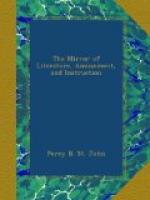“And food for worms brave Percy!”
exclaimed Prince Henry over the expiring body of Hotspur.
This observation was made by a person who saw the remains on the 8th of August, 1832, an older object by twelve years, and without teeth,—a gum-biter!
An old inhabitant of CLIFFORD’S inn.
* * * * *
THE ROSE OF THE CASTLE.
A summer morn, with all its golden light,
Gilded the snowy bosom of the cloud,
And robed the verdant earth with sunny
hues.
The bees sang music to their passion-flow’rs,
The birds, with melody which seem’d
to gush
From joyful hearts, entranced the crystal
air;
But, spectre-like, the ancient castle
frown’d
Over the deep, whose softly-rippling waves
Reflected its array of ruined towers.
In times of old, the gallant chiefs for
whom
Its stately walls arose, the men who made
Their names a terror to the Saracen,
Adopted as their symbol in the field,
The rose—that flower of faction
and of blood!
I saw it sculptured on the marble shield
Which graced the lofty gate, it was enroll’d
Among the records of departed days;
Over the hearth, upon the pictured crest
It met mine eye, and to my mind recall’d
The glorious deeds of England’s
chivalry.
The Rose—it appear’d
on the portal proud,
Which the ivy robed in its mournful shroud;
As the sunshine gleam’d in the silent
hall
I traced its image upon the wall.
Although the castle was old and grey,
And its summer of glory had pass’d
away,
Though the roof had fall’n, and
the walls sunk low,
The rose still smiled in the sunbeam’s
glow.
But, oh! that symbol of purest faith
Had cheer’d the heart in the hour
of death,
And shone triumphant o’er the brave
As they crush’d the power of the
sceptred slave.
It seem’d like a spell on the lips
of all
Whom the trumpet call’d from their
festive hall,
And the soldier to it upturn’d his
eye
As he lay on the grassy turf to die.
But it gleams no more on land or sea,
A star to the feudal chivalry!
On the silent hearth, and the ivied tower,
Hath it found a last forsaken bower.
G.R.C.
* * * * *
RETROSPECTIVE GLEANINGS.
* * * * *
Spirit drinking.
(TO THE EDITOR.)
Much as has been said about gin-drinking in the present times, it would appear from the following curious extract, that our forefathers (of the last century,) were more addicted to that pernicious custom, than we are even in the nineteenth century:—




